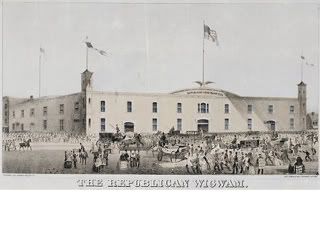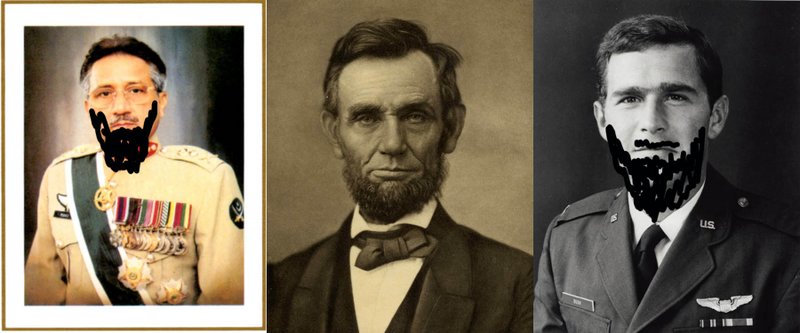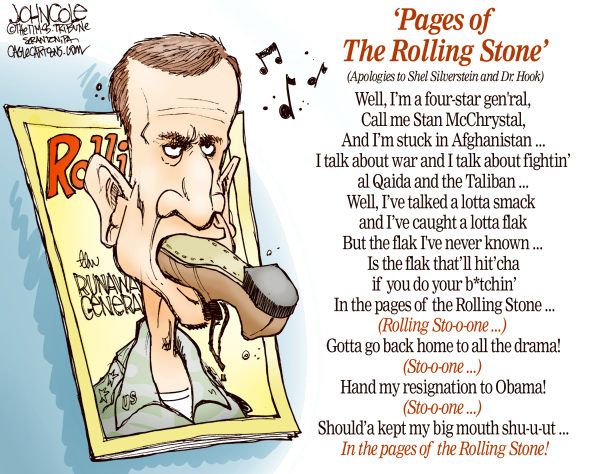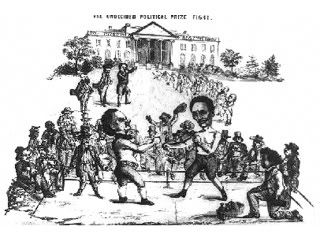This past holiday weekend I visited two Civil War battlefields: Antietam and Gettysburg. While part of my motivation to go was purely the tourist’s curiosity, I also went to remind myself of the multitude of ironies present in armed conflict. It does me well to contemplate what I believe to be the overall futility of warfare, regardless of the context. I certainly found plenty of both. I chose to go in part to celebrate Independence Day in a completely different sort of context. While I do appreciate the sacrifices made to establish a new nation and with it a groundbreaking experiment in Democracy, my pacifist beliefs often leave me deeply conflicted. To move nearly one hundred years forward in time from the Revolutionary War to the conflict that tore a hole in our nation’s fabric seemed much more suited for the occasion.
Tag: abraham lincoln
Jun 29 2010
The Week in Editorial Cartoons – Afghanistan’s Future Through the McChrystal Ball
Crossposted at Daily Kos
|
|
|
|
May 31 2010
Abe Lincoln: when “Corporations have been enthroned” a chilling prediction coming true
I see in the near future a crisis approaching that unnerves me and causes me to tremble for the safety of my country. As a result of the war, corporations have been enthroned and an era of corruption in high places will follow, and the money power of the country will endeavor to prolong its reign by working upon the prejudices of the people until all wealth is aggregated in a few hands and the Republic is destroyed. I feel at this moment more anxiety for the safety of my country than ever before, even in the midst of war. God grant that my suspicions may prove groundless.”
— U.S. President Abraham Lincoln, Nov. 21, 1864
(letter to Col. William F. Elkins)
Ref: The Lincoln Encyclopedia, Archer H. Shaw (Macmillan, 1950, NY)Bold text added by the diarist
(Note: The authenticity of this quote has been disputed, but I believe it is worthwhile to discuss nonetheless. The link I have provided is my proof of the validity of this quote, but I leave it to you, the reader, to decide.)
Almost 150 years later . . .
More below the fold
Mar 24 2010
Thoughts on the anti-war movement as of March 2010
This post was written as part of GreenChange blog action day. Learn more here.
The anti-war movement seems to be at a crossroads these days. The rapid contraction of anti-war activism after George W. Bush left office caused many skeptics, including activists themselves, to wonder if most of the protesters had been more anti-Bush than anti-war. However, there are signs that the ranks of Americans who are determined to protest the evils of war, no matter which party controls the White House, is growing.
A December rally in Washington DC against the escalation of the Afghanistan War, which featured an impressive lineup of speakers including Chris Hedges, Cynthia McKinney, Dennis Kucinich, Mike Gravel, and Ralph Nader, nevertheless attracted only a small number of supporters – probably less than 1000. The recent March 20th anti-war march in Washington DC attracted between 2500 and 10000 supporters. That’s still a far cry from the hundreds of thousands who would march during the Bush regime, but it may be a sign that the movement is recovering from its post-election inaction.
I remember hearing from people familiar with United For Peace & Justice (UFPJ), a nationwide umbrella group for anti-war organizations, that UFPJ leaders opted not to put their organizing muscle behind the March 20 protest. I’m out of the country and out of the loop, so I can’t confirm if that’s true. If it is true, I think it’s a big mistake for a self-described anti-war organization to downplay an anti-war protest. If anti-war group leaders view President Obama as more receptive to their message, that’s all the more reason for them to put pressure on him to do the right thing.
Ross Levin has a great post on how the 3/20 anti-war march in DC, which he attended and reported from, got significantly less media coverage than a significantly smaller Tea Party rally against healthcare reform across town.
It’s an open secret that the “grassroots” Tea Party movement is actually an astroturf operation, promoted by establishment media pundits like Rick Sanchez and Glenn Beck and funded by establishment political operatives like Dick Armey. Yet the mainstream media coverage treats the Tea Party protests like a genuine grassroots conservative uprising. My question is: can anti-war organizers convert this state of affairs into greater publicity for their movement?
Just the fact that anti-war rallies attract more people than tea parties won’t get them more coverage, but maybe if anti-war organizers made the “we’re bigger than the tea party” challenge integral to their actions, and communicated it to both the mainstream and independent media (as well as creating their own media), it would get more press and attract more attention from the general public.
Another idea (just throwing it out there): an “An-TEA-War PARTY protest”, in which anti-war protesters would mimic tea partiers by standing on the Capitol steps and screaming anti-war slogans at passing members of Congress. By holding signs saying “An-TEA-War PARTY”, these protesters could attract the Tea-Party-loving press.
Another idea: antiwar protesters could have simply marched past the tea party protest, in an attempt to highlight the media’s bias in giving greater coverage to a smaller protest. Intrepid protesters could even join the Tea Partiers and wave their anti-war signs for the cameras. Such tactics would probably require nonviolence training, since some tea partiers could get physical and it would not be good if the anti-war protesters retaliated.
One more demonstration idea: I’ve often thought it would be interesting if someone organized a march in the style of a 1930s labor rally. Everyone would wear suits or dresses, and carry black-and-white signs and banners with simple lettering and straightforward messages. To my mind, a protest like that could attract media attention and get people talking.
In case I’ve offended anyone who thinks the tea parties are cool, there is an encouraging initiative from Voters For Peace to broaden the anti-war movement to include folks who don’t usually show up for anti-war events. Here’s Sam Smith’s take on the effort:
“Last Saturday I spent eight hours with three dozen other people in a basement conference room of a Washington hotel engaged in an extraordinary exercise of mind and hope.
The topic was, by itself, depressingly familiar: building an anti-war coalition. What made it so strikingly different was the nature of those at the table. They included progressives, conservatives, traditional liberals and libertarians. Some reached back to the Reagan years or to 1960s activism, some – including an SDS leader from the University of Maryland and several Young Americans for Liberty – were still in college.”
I’ve read the foreign policy chapter of Ron Paul’s book, and I felt that he was right on the money about many things, like ending US wars in the Middle East, closing US military bases in other countries, and cutting off military aid to foreign governments like Israel and Egypt. In the same coalition-building vein, we can only benefit by more often invoking the anti-militarism words of people who conservatives revere, like Dwight Eisenhower and George Washington. I’ll add some choice quotations below.
Another great thing about Voters For Peace is that it’s involved in both grassroots activism and legislative pressure campaigns. To be effective, the anti-war movement must get serious about pressuring politicians. Pressuring politicians requires setting specific goals that they can be held accountable to. For the anti-war movement, that means war funding, since Congress can end the occupations in Iraq and Afghanistan only by refusing to fund them.
The most effective pressure tactic would be organizing a nationwide voter pledge not to vote for any politician who votes for war funding. If you want a politician to pay attention, tell them they won’t get your vote if they don’t meet your conditions. The Democratic majority has voted solidly to continue the wars, but make them feel that their majority is at risk if they fail to end the wars, and that’s how you get real action.
In many districts, instead of voting for a pro-war incumbent in the general election, you can vote for a Green, anti-war Libertarian, or other independent. The anti-war movement needs to show politicians that only anti-war candidates will earn our votes from now on.
What are your thoughts?
QUOTATION TIME!
“Our detached and distant situation invites and enables us to pursue a different course. If we remain one people under an efficient government. the period is not far off when we may defy material injury from external annoyance; when we may take such an attitude as will cause the neutrality we may at any time resolve upon to be scrupulously respected; when belligerent nations, under the impossibility of making acquisitions upon us, will not lightly hazard the giving us provocation; when we may choose peace or war, as our interest, guided by justice, shall counsel.
Why forego the advantages of so peculiar a situation? Why quit our own to stand upon foreign ground? Why, by interweaving our destiny with that of any part of Europe, entangle our peace and prosperity in the toils of European ambition, rivalship, interest, humor or caprice? ”
-George Washington
“He who is the author of a war lets loose the whole contagion of hell and opens a vein that bleeds a nation to death. ”
-Thomas Paine
“Believing that the happiness of mankind is best promoted by the useful pursuits of peace, that on these alone a stable prosperity can be founded, that the evils of war are great in their endurance, and have a long reckoning for ages to come, I have used my best endeavors to keep our country uncommitted in the troubles which afflict Europe, and which assail us on every side.”
-Thomas Jefferson
“Of all the enemies of public liberty, war is perhaps the most to be dreaded, because it comprises and develops the germ of every other. ”
-James Madison
“Allow the president to invade a neighboring nation, whenever he shall deem it necessary to repel an invasion, and you allow him to do so whenever he may choose to say he deems it necessary for such a purpose – and you allow him to make war at pleasure. ”
-Abraham Lincoln
“The best way to destroy an enemy is to make him a friend… Am I not destroying my enemies when I make friends of them?”
-Abraham Lincoln
” In the councils of government, we must guard against the acquisition of unwarranted influence, whether sought or unsought, by the military-industrial complex. The potential for the disastrous rise of misplaced power exists and will persist.
We must never let the weight of this combination endanger our liberties or democratic processes. We should take nothing for granted. Only an alert and knowledgeable citizenry can compel the proper meshing of the huge industrial and military machinery of defense with our peaceful methods and goals, so that security and liberty may prosper together. ”
-Dwight Eisenhower
“Every gun that is made, every warship launched, every rocket fired, signifies in the final sense a theft from those who hunger and are not fed, those who are cold and are not clothed. ”
-Dwight Eisenhower
Jan 27 2010
Presidential “Hit List”
Is President Obama sanctioning the assassinations of American citizens without due process just as George W, Bush did? It would appear that is exactly what he is doing.
President Obama has now extended Bush’s “War on Terror” to Yemen. In today’s Washington Post there is an article by Dana Priest where she writes:
U.S. military teams and intelligence agencies are deeply involved in secret joint operations with Yemeni troops who in the past six weeks have killed scores of people, among them six of 15 top leaders of a regional al-Qaeda affiliate, according to senior administration officials.
snip
As part of the operations, Obama approved a Dec. 24 strike against a compound where a U.S. citizen, Anwar al-Aulaqi, was thought to be meeting with other regional al-Qaeda leaders. Although he was not the focus of the strike and was not killed, he has since been added to a shortlist of U.S. citizens specifically targeted for killing or capture by the JSOC, military officials said. The officials, like others interviewed for this article, spoke on the condition of anonymity because of the sensitivity of the operations.
(emphasis mine)
Aug 12 2009
Domestic Terrorist & Coward!!
William Kostric wears a 9mm pistol as he stands outside a town hall meeting on healthcare held by President Obama, in Portsmouth, N.H., Tuesday. Who was that gun-toting anti-Obama protester?
One of Tuesday’s big mysteries was the motivation behind anti-Obama protester William Kostric, the man who brought a loaded gun to the town hall meeting and carried a sign referencing Thomas Jefferson’s famous credo, “The tree of liberty must be refreshed from time to time with the blood of tyrants and patriots.”
Snip
But at least one of those statements doesn’t seem to be true. A right-wing activist named “William Kostric,” who’s left a lot of footprints around the Web, is listed as a “team member” of the Arizona chapter of We the People, the far-right group best known for joining a lawsuit challenging Obama’s right to be president based on his not being a U.S. citizen. Kostric told MSNBC he recently moved from Arizona to New Hampshire. (Kostric did not reply to Salon’s e-mail request for an interview.)…………………
Dec 08 2008
Obama’s Team of Reactionaries
Original article, by Tom Eley, via World Socialist Web Site:
In recent weeks, numerous media accounts have referred to President-elect Barack Obama’s cabinet selections as a “team of rivals.” The reference is to a book of the same name by the historian Doris Kearns Goodwin on Abraham Lincoln’s choices for key cabinet posts after his victory in the 1860 election, when he confronted the secession crisis and then the Civil War.
Mar 10 2008
The Republican National Convention of 1860
In 1856, the Republican Party met for the first time to put together a platform
http://alpha.furman.edu/~benso…
and ready itself for the first presidential run. Chicago was chosen for the first convention. The convention was held at the Wigwam,

a wooden structure built expressly for the convention. The Republican Party appointed delegates at the state level. These people were chosen to determine the best candidate to represent the party in the general election.
Cross posted at EENR
Jan 18 2008
Photography and Art
The Library of Congress has discovered a few new photos from Lincoln’s second inauguration. High resolution images are available at their site.

And Spiegel Online reveals that the true identity of the Mona Lisa has been discovered:
The enigmatic smiling woman painted by Leonardo da Vinci in the sixteenth century has for long been known simply as the “Mona Lisa.” But her true identity was a mystery, providing fodder for countless theories. Now a manuscript hidden away in a German library may have unlocked the key to her real name.
Heidelberg University library confirmed last Friday a German radio report that its researchers had discovered the true identity of the model in the famous 16th century portrait. She was Lisa Gherardini, the wife of a wealthy Florentine merchant, Franceso del Giocondo.
The director of the university library, Veit Probst, said the mystery was unravelled after a book was found in the library archive that once belonged to a friend of da Vinci. In October of 1503 the Florentine official Agostino Vespuccui wrote a note in the margins of one page, saying that his friend was working on three paintings, one of them a portrait of Lisa del Giocondo. The note, scribbled into a collection of letters by the Roman orator Cicero, compares the Florentine painter and sculptor to the ancient Greek artist Apelles.
Nov 04 2007
Democracy: Lincoln, Bush, and Musharraf Style

Back in 2004, Thomas J. DiLorenzo wrote a piece titled “Bush’s Lincolnian Assault on Civil Liberties (Or, Al Gore is Right!)” Here is some background information:
Under Abraham Lincoln, Habeas corpus was unilaterally (and illegally) suspended … and the military, with the help of a secret police bureaucracy operated by William Seward, imprisoned tens of thousands of Northern political opponents. They were thrown into gulags such as Fort Lafayette in New York harbor where they were never charged, had no idea how long they would be held, and their families often had no idea of their whereabouts. (See James Randall, Constitutional Problems Under Lincoln; and Dean Sprague, Freedom Under Lincoln). The Virginia patriot George Washington would have undoubtedly drawn his sword and fought another revolution over such an outrage.


